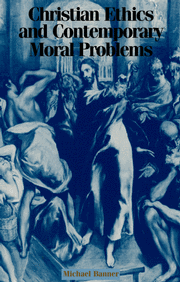Book contents
- Frontmatter
- Contents
- Preface
- Acknowledgements
- 1 Turning the world upside down – and some other tasks for dogmatic Christian ethics
- 2 Christian anthropology at the beginning and end of life
- 3 The practice of abortion: a critique
- 4 Economic devices and ethical pitfalls: quality of life, the distribution of resources and the needs of the elderly
- 5 Why and how (not) to value the environment
- 6 On not begging the questions about biotechnology
- 7 ‘Who are my mother and my brothers?’: Marx, Bonhoeffer and Benedict and the redemption of the family
- 8 Five churches in search of sexual ethics
- 9 Prolegomena to a dogmatic sexual ethic
- Bibliography
- Index
3 - The practice of abortion: a critique
Published online by Cambridge University Press: 21 May 2010
- Frontmatter
- Contents
- Preface
- Acknowledgements
- 1 Turning the world upside down – and some other tasks for dogmatic Christian ethics
- 2 Christian anthropology at the beginning and end of life
- 3 The practice of abortion: a critique
- 4 Economic devices and ethical pitfalls: quality of life, the distribution of resources and the needs of the elderly
- 5 Why and how (not) to value the environment
- 6 On not begging the questions about biotechnology
- 7 ‘Who are my mother and my brothers?’: Marx, Bonhoeffer and Benedict and the redemption of the family
- 8 Five churches in search of sexual ethics
- 9 Prolegomena to a dogmatic sexual ethic
- Bibliography
- Index
Summary
INTRODUCTORY
Destruction of the embryo in the mother's womb is a violation of the right to live which God has bestowed upon this nascent life. To raise the question whether we are here concerned already with a human being or not is merely to confuse the issue. The simple fact is that God certainly intended to create a human being and that this nascent human being has been deliberately deprived of his life. And this is nothing but murder. A great many different motives may lead to an action of this kind; indeed in cases where it is an act of despair, performed in circumstances of extreme human or economic destitution and misery, the guilt may often lie rather with the community than with the individual. Precisely in this connexion money may conceal many a wanton deed, while the poor man's more reluctant lapse may far more easily be disclosed. All these considerations must no doubt have a quite decisive influence on our personal and pastoral attitude towards the person concerned, but they cannot in any way alter the fact of murder.
These words of Dietrich Bonhoeffer, no matter the view we take of abortion, ought to prove somewhat shocking to contemporary Christians. The shock is not to do with his critical attitude to abortion as such, since critical attitudes, if less common than when he wrote, are still familiar enough. What will shock those familiar with the current debate amongst Christians is his view that this critical attitude is so very obviously the right and proper one as to stand in need of no extended defence. Bonhoeffer's view is straightforward and easily stated.
- Type
- Chapter
- Information
- Christian Ethics and Contemporary Moral Problems , pp. 86 - 135Publisher: Cambridge University PressPrint publication year: 1999



